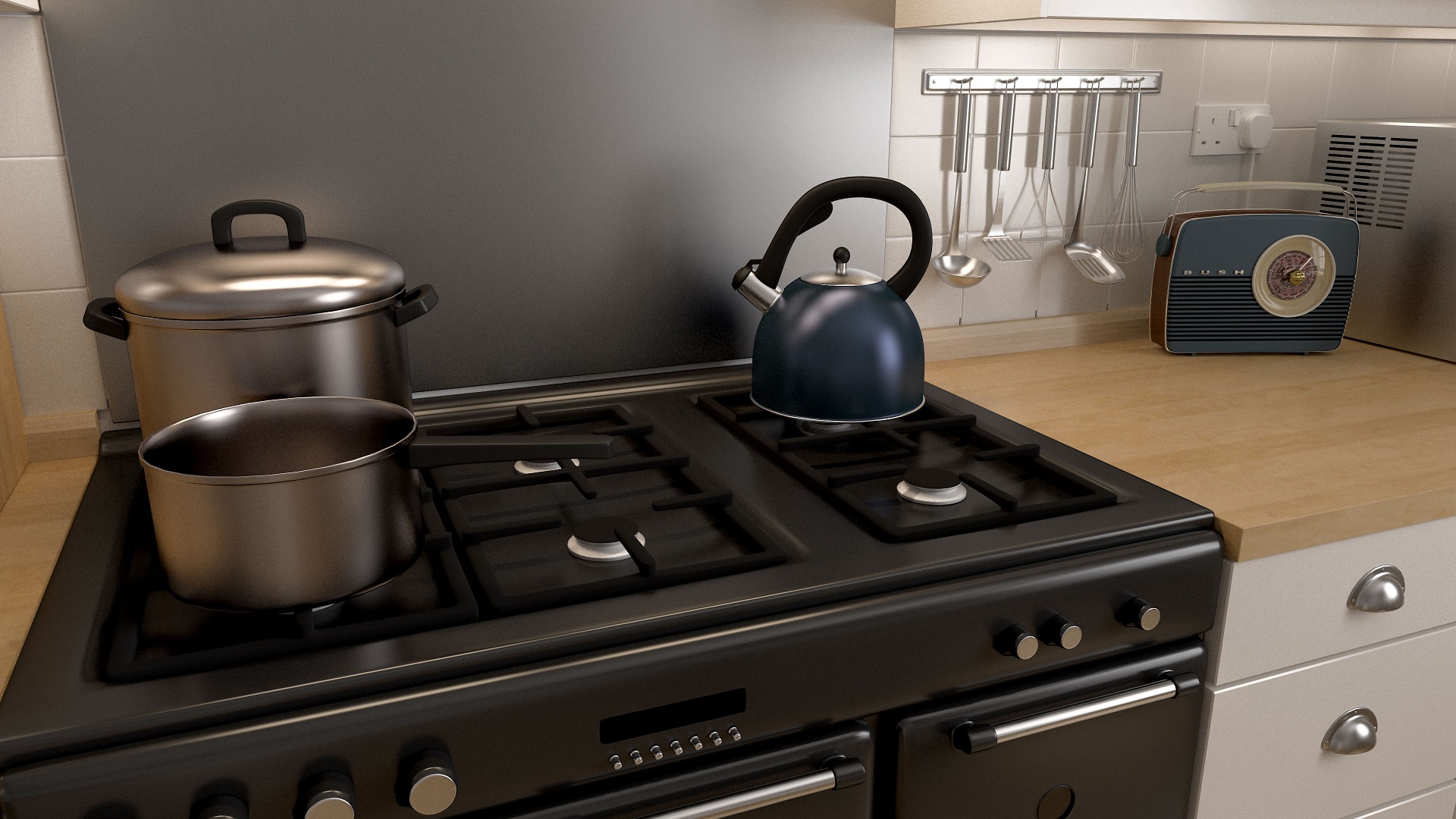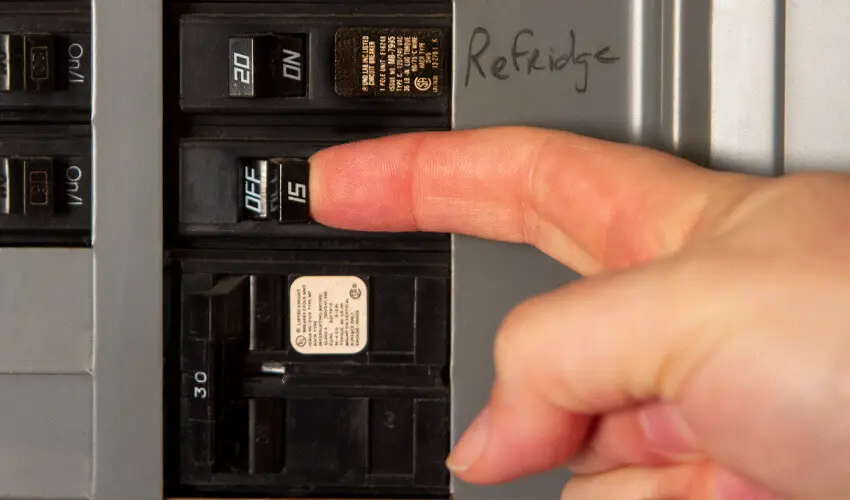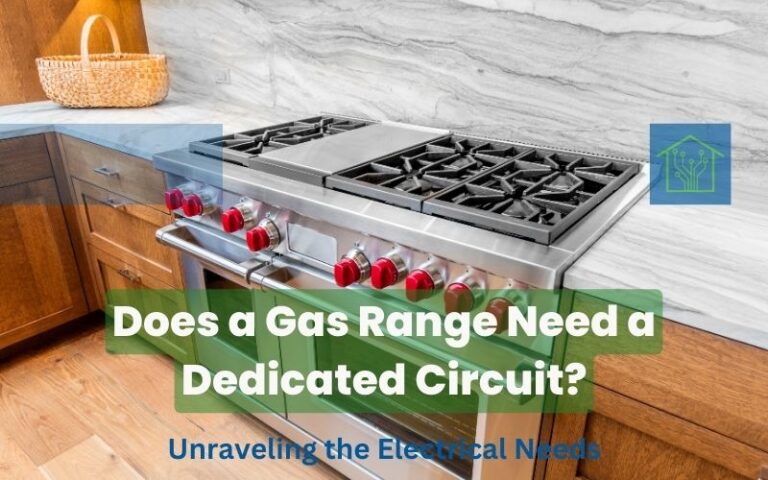Does a Gas Range Need a Dedicated Circuit? When it comes to powering kitchen appliances, the electrical needs can vary significantly. For a gas range, the question of whether it requires a dedicated circuit is one that often arises. Given that the average gas range consumes between 4,000 and 8,500 watts of power, it’s clear that these appliances have substantial electrical demands. This high power consumption is due to modern features such as electric displays, timers, self-cleaning cycles, lights, and high-capacity igniters. To ensure these features function seamlessly and to prevent any electrical issues, a gas range indeed needs a dedicated circuit.
A dedicated circuit ensures that the gas range has the consistent power it needs to operate efficiently. Without one, the risk of overloading the circuit increases, potentially leading to electrical problems. It’s essential for safety and performance that a dedicated circuit powers the range controls, keeping them separate from other demands that might overload the circuit. A standard 120/125-volt outlet is typically required, but this can vary based on specific needs and configurations, especially as some gas ranges and their associated vent hood or convection oven are separate units.
Understanding the Electrical Requirements for Gas Stoves
While gas stoves primarily rely on gas for their operation, they also encompass several electrical components crucial for their functionality. These include the electronic ignition system, which requires electricity to generate the spark that lights the gas, and control valves that manage gas flow. Given these electrical components, a gas stove typically needs a 15-amp or 20-amp circuit, ensuring that there is enough power to support these functions without compromising on safety or efficiency.
Why a Dedicated Circuit for a Gas Range is Essential

Not having a dedicated circuit for a gas range invites a host of problems. These can range from frequent tripping of the circuit breaker to an increased risk of fire hazard due to circuit overload. These issues not only pose significant safety risks but can also affect the range’s performance and efficiency. Thus, ensuring a dedicated circuit for a gas range is paramount for both safety and functionality.
Safety
One of the primary reasons a dedicated circuit for a gas stove is crucial is safety. A dedicated circuit ensures that the stove has an uninterrupted power supply, significantly reducing the risk of electrical fires. If the circuit is overloaded, it increases the chance of sparking these fires, making a dedicated circuit a vital safety measure.
Reliability
Having a dedicated circuit for a gas range also ensures reliability. An uninterrupted power supply means that the gas stove can function optimally without the risk of power dips or outages that can occur when a circuit is shared with other appliances. This reliability is especially important for kitchen appliances like gas ranges that are used frequently and for tasks that require consistent heat.
Consistency
A dedicated circuit ensures electrical safety and contributes to the consistent operation of a gas range. By having a dedicated circuit, the risk of circuit overload is minimized, ensuring that the gas range receives a stable power supply. This stability is crucial for maintaining the desired temperature and performance levels, especially when using features like the convection oven or high-capacity igniters.
The Power Consumption of an Oven
To calculate the power consumption of an oven, you can use a simple formula that factors in the wattage and the hours used per day. For instance, an oven with a wattage of 2000 watts, used for 2 hours a day, would have a power consumption of 4 kWh per day. Understanding the power consumption of an oven is essential for gauging its impact on your electrical system and ensuring that your kitchen’s electrical capacity meets your cooking needs.
How Many Amps Does a Gas Stove Require?
The electrical requirements for a gas stove can vary significantly depending on the model and features. Generally, a 50-amp circuit is recommended to accommodate the power needs of modern gas stoves and ranges. However, simpler models may require only 10-30 amps. Given this variation, it’s crucial to check the specific electrical requirements for your gas stove to provide it with the appropriate power supply and ensure safe, efficient operation.
The Risks of Overlooking a Dedicated Circuit
Ignoring the need for a dedicated circuit for a gas stove can lead to serious risks. The electrical components, such as ignition systems, require a stable and uninterrupted power supply. Sharing a circuit with other appliances can result in voltage drops and power fluctuations, affecting the stove’s performance and increasing the risk of electrical shock and fire hazards. Regular maintenance and ensuring a dedicated circuit for a gas stove are critical for its safe operation.
Electrical Safety Concerns with Gas Stoves
While gas stoves are generally considered safe, there are electrical safety concerns that must not be overlooked. The gas stove’s electrical components are pivotal for its operation, and any malfunction in these components can pose safety risks.
Shock Hazard
The electrical components of a gas stove, such as the electronic ignition system, can be sources of electrical shock if not properly maintained or if the stove is not correctly grounded. Ensuring these components are in good working order is essential for minimizing the risk of electrical shock.
Fire Hazard
Electrical fires are a significant concern with gas stoves, especially if the dedicated circuit for the gas stove is not properly maintained or if there is a risk of overloading. Regular maintenance and a dedicated circuit ensure that the stove operates safely, minimizing the potential for electrical fires.
Problems of Not Having a Dedicated Circuit for a Gas Range

Without a dedicated circuit, a gas range is prone to issues such as frequent tripping of the circuit breaker, which can disrupt cooking and pose safety risks.
Reduced Risk of Electrical Shock
A dedicated circuit that is properly grounded provides an uninterrupted power supply, significantly reducing the risk of electrical shock. This grounding is critical for the safe operation of a gas range, ensuring that any electrical faults do not lead to dangerous situations.
Lower Risk of Fire
Ensuring a dedicated circuit for a gas stove, along with regular maintenance, significantly lowers the risk of electrical fires. A dedicated circuit reduces the risk of overloading, which is a common cause of electrical fires, making it an essential measure for the safe use of gas ranges.
Practical Insights into Gas Range Installation
Can You Plug a Gas Stove Into a Regular Outlet?
Yes, a gas stove can be plugged into a regular 120-volt outlet, which is enough to power the oven’s ignition system. However, this doesn’t mean it will meet all the power requirements for modern features like electronic displays or timers. To ensure these features work correctly and to avoid any operational issues, a gas stove requires a dedicated circuit. Without it, you may encounter problems like the stove not functioning as expected or even shutting off unexpectedly.
Calculating the Power Consumption of an Oven
To calculate the power consumption of an oven, you use a simple formula. First, you find out the wattage of your oven and how many hours a day you use it. Then, multiply these two numbers together and divide by 1000 to get the power consumption in kilowatt-hours (kWh). For instance, if your oven is 2000 watts and you use it for 2 hours each day, the calculation would be 2000 watts times 2 hours divided by 1000, which equals 4 kWh per day. This calculation helps you understand how much electricity your oven uses, which can be helpful for managing energy costs.
The Bigger Picture: Household Electrical Circuit Requirements
In every home, electrical circuits form a loop of wire that begins and ends at the breaker panel. When an appliance demands a dedicated circuit, it’s allocated a unique loop that no other appliances or fixtures share. This setup is crucial for appliances that need a lot of power to operate safely and effectively without causing overloads or electrical issues.
What Appliances Need a Dedicated Circuit?
Several appliances in your home require a dedicated circuit to operate safely and efficiently. These include heating and cooling systems, refrigerators, freezers, ovens, stoves, ranges, hot water heaters, microwaves, sump pumps, and more. These appliances have high power draw and can overload a circuit if they share it with other devices. For example, gas ovens, sump pumps, and certain heat-producing devices like electric ovens and dryers need dedicated circuits. This prevents electrical overload, ensuring your appliances run smoothly and safely.
Can a Gas Stove Share a Circuit?
While it’s possible for a cooktop and wall oven to share a single circuit if their combined power draw does not exceed the safe capacity of the circuit, each gas stove should ideally have its own dedicated circuit for safety reasons. Sharing a circuit with a gas stove and large appliances, such as dishwashers, is not recommended. A dedicated circuit ensures that the gas stove operates safely without the risk of overloading the circuit, which could lead to safety hazards.
DIY vs Professional Installation: What You Need to Know
Installing a gas stove requires careful consideration of its electrical components, such as ignition systems, control valves, and temperature sensors. These components need an uninterrupted power supply for the stove to function safely and reliably. Sharing a circuit with other appliances can cause voltage drops and power fluctuations, affecting the stove’s performance and raising the risk of electrical shock and fire hazards. Thus, a dedicated circuit for a gas stove is strongly recommended. Regular maintenance and professional inspections are also crucial for the safe operation of your gas stove.
Understanding the Installation Process
When installing a gas stove, it’s important to understand the process involves more than just plugging it in. You need to ensure that the electrical outlet meets the stove’s power requirements and that the stove is properly grounded. If you’re not familiar with electrical systems or if the installation seems complex, it’s best to seek professional help. This ensures that the installation is done safely and complies with all local building and safety codes.
When to Call a Professional
If you’re unsure about the installation process of a gas stove or if you want to ensure that it meets all National Electrical Code (NEC) requirements, it’s best to call a professional. Professionals like Mr. Appliance can provide valuable guidance, ensuring that your appliances operate safely and at peak performance. They offer flat-rate pricing, flexible scheduling, and guaranteed workmanship. So, if you need help with your gas stove installation or maintenance, don’t hesitate to schedule a service.
Enhancing Your Kitchen’s Safety and Efficiency
In older homes, kitchen wiring may not meet the electrical demands of modern kitchens. Often, these kitchens have only two or three circuits, which might not be enough for today’s appliances. Upgrading your kitchen wiring can significantly enhance safety and efficiency, preventing overloads and potential hazards.
The Role of a Dedicated Circuit in Kitchen Safety
Using a dedicated circuit for a gas stove significantly reduces the risk of electrical shock and fire hazards. It ensures that the stove has a consistent and safe power supply, meeting all code requirements for kitchen circuits. This not only makes your kitchen safer but also improves the reliability and efficiency of your gas stove.
Improving Your Kitchen’s Electrical System for Future Needs
Gas stoves have specific electrical requirements for safe and proper operation. These include needing a 120-volt or sometimes a 240-volt outlet and having specific amperage needs based on the stove’s size and electrical components. Understanding these requirements is crucial for ensuring your kitchen’s electrical system can safely handle the electrical load and power consumption of your gas stove, as well as other appliances. Upgrading your kitchen’s electrical system can prepare it for future needs, making it more versatile and accommodating for various appliances.
Final Reflections: Does a Gas Range Need a Dedicated Circuit?
Understanding the necessity of a dedicated circuit for a gas range closes the loop on ensuring kitchen safety and appliance efficiency. The risks associated with not having a dedicated circuit, such as frequent tripping of the circuit breakers and the potential for fire hazards due to overloading, highlight the critical nature of this setup. When I consider the importance of a dedicated circuit, it becomes clear that it’s not just about following best practices but about protecting my home and family from unnecessary risks.
Choosing to install a dedicated circuit for a gas range is a proactive measure that offers peace of mind. It ensures that the circuit that serves the range is not burdened by other appliances, which could include anything from a microwave oven consuming up to 1500 watts to a lighting circuit. This separation not only prevents the overloading of circuit breakers but also secures the consistent and reliable performance of the single appliance in focus – the gas range. The foresight to install a dedicated circuit today prepares my kitchen for a safer and more efficient tomorrow.
Share the joy

Written By Gemma Wilson
Gemma is an expert at writing about how appliances are made and how to use them. She can tell you how to choose the best appliances for your needs and how to take care of them properly. She can also give helpful tips on how to fix and troubleshoot appliances and give advice on how to choose the most energy-efficient ones.